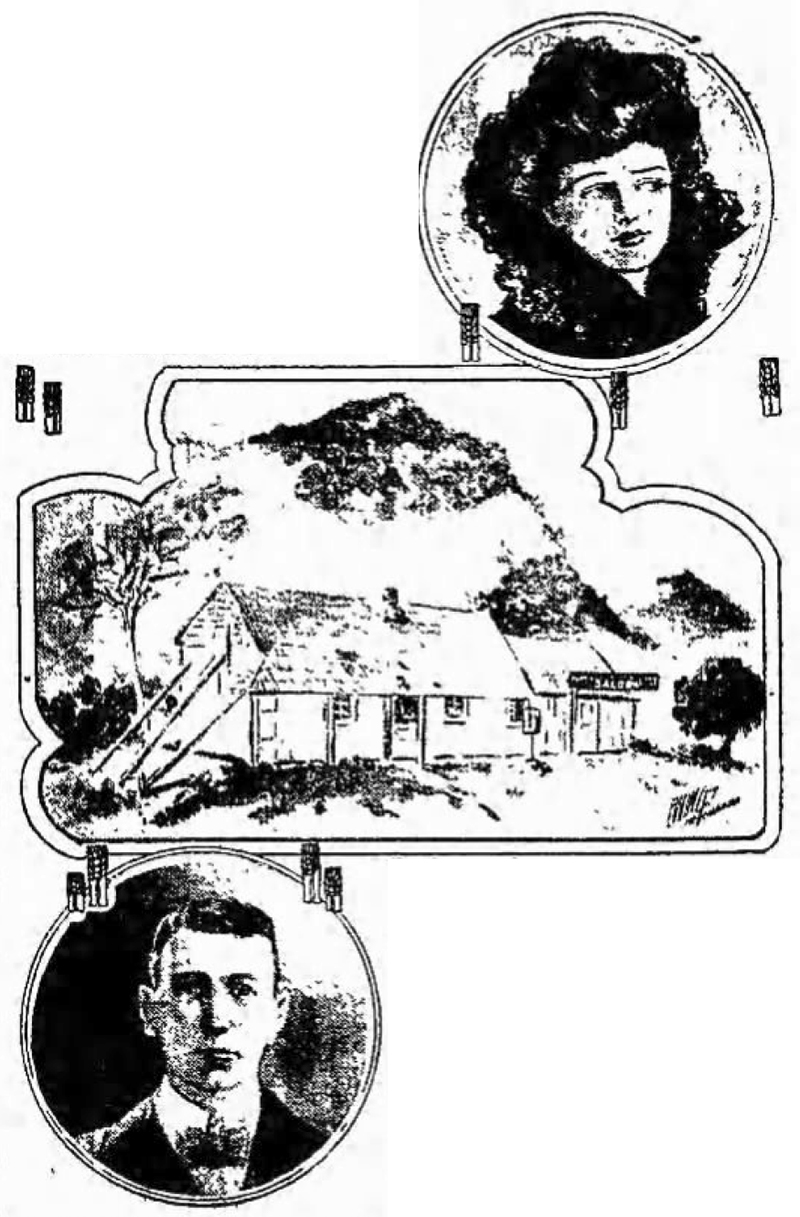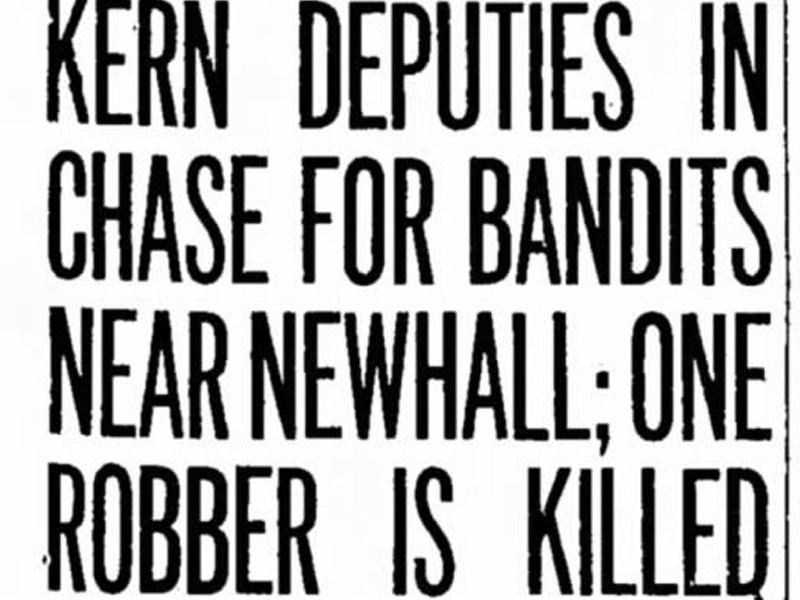
Click to enlarge.
|
SHATTERED GLASS HOLDS A MYSTERY.
Tragedy of Lonely Fremont Pass Unfathomed, and Beautiful Girl's Story Causes Doubt at Fernando — Sherlock Holmes Case.
Los Angeles Times | Wednesday, Mar 7, 1906, Page 17.
The Coroner's verdict of "suicide" has not stilled the suspicion in San Fernando that Elson Dunbar [sic; s/b Alson C. Dunbar] was murdered Sunday night at the picturesque lonely old roadhouse in Fremont Pass.
The only one who really knows how he died is his young and beautiful Spanish wife.
She is hurt to the quick because the accusing finger of Gossip is inevitably pointing at her.
All the officers who have worked on the case agree as to her entire innocence; but the talk of the old village stubbornly clings to her.
Her striking beauty and the fact that she is a daughter of one of the older families in California, gives this gossip a peculiar and unusual interest.
In justice to this pretty girl, it is right that the peculiar circumstances upon which this suspicion rests should be plainly related lest they shall grow and spread with time.
All the facts — those alleged to be damaging and otherwise — are now fresh and should be capable of proof or disproof.
The Coroner has considered them all and has no hesitation in the conclusion that they show nothing but the woman's absolute innocence.
Dr. Conan Doyle would call It "The Affair of the Broken Pane of Glass."
As a girl, "Tillie" Lopez was the belle of San Fernando, and she has been pretty much of a belle ever since. She must be still in the twenties.
When a young girl, she was married to a son of former Chief of Police King of Los Angeles. It was an unhappy match. King left her and they were divorced.
Four years ago this sedate, quiet Scotchman, Elson Dunbar, came awooing. It was a strange love match — calm, slow Scot; volatile, fiery, vivacious Spanish girl.
All San Fernando people agree that he was gentle and kind to her. She says herself, through her tears, that he always treated her like a baby.
It is evident, however, that they were not altogether prosperous in this world's goods.
"Pete" Lopez, well known as a small-fry politician, is a brother of Mrs. Dunbar; he helped them out.
WILD BEAUTY SPOT.
In the lonely, wild beauty of Fremont Pass, six miles north of San Fernando, Pete owned an old adobe house. It used to be the stage station in the old days; afterward the collecting station for the old toll road through the pass.
Of late years it has been falling to pieces, dropping away bit by bit. Dunbar and his wife were installed there to run a roadhouse. With grim, if somewhat aged humor, they named the place the "First and Last Chance Saloon," San Fernando being a prohibition town — except when "Ins" is on tap.
No more desolate, wild or picturesque spot could be imagined. It lies in a narrow cut through the hills which rise sheer and wild and shaggy on every side. It is a place for awe, reverential fear, solemn exaltation; not steam beer.
Few American women could have endured the loneliness of that little cabin in the still heart of the mountains.
One end of the little hacienda was fitted up as a barroom, the center of the house was a living room, with an old-fashioned Spanish fire place; the further end from the barroom was the bedroom.
WIDOW TELLS OF TRAGEDY.
Sunday night, after Mrs. Dunbar had retired, her husband entered the room with the cash from the money drawer in the barroom, and his revolver. In accordance with his custom he tried to put them under his pillow. He was somewhat intoxicated, however, and dropped the revolver on the floor.
These facts and those that follow are based on the story of Mrs. Dunbar; she and he were there together — no one else.
"He went to the front door," she said in telling the story to a Times reporter yesterday.
"Presently, I heard a pistol shot and ran out after him. He was lying on the ground and the blood was spouting from his breast. I called to him and took his head in my hands and tried to make him speak to me. But he would not.
"I was frightened and ran down the mountain road as fast as I could to a railroad camp half a mile or so away — out of sight around the mountain. [Illegible] came back as fast as I could. When we got back, my husband was dead with the pistol lying by his side."
In telling the story Mrs. Dunbar gave every evidence of genuine and sincere grief. She kept saying: "He was so good to me."
BUT ACCOUNTS DIFFER.
Unfortunately, the accounts of those who first got to the body do not agree.
Frank Morone, a San Fernando man who was early on the scene tells the townspeople that the body was shot through and through; that the wound in the back was small; the sound in the breast large and torn, after the manner of a bullet entering from the back and coming out at the breast.
Constable Strader of San Fernando states, however, that the bullet did not go through the body at all but entered the breast at the heart, and lodged somewhere within.
TWO VITAL POINTS.
This, with a peculiar circumstance of a broken pane of glass, are the vital points in the case.
Men do not shoot themselves in the back when they commit suicide.
But Coroner Trout says he is perfectly satisfied that the bullet entered the breast. The flesh was torn and powder-burned as though the muzzle had been pressed tightly by the hand of a self-killer.
The broken pane of glass is worthy of a Sherlock Holmes story.
Just on line with a spot where the body was found is this mute, shattered window glass. The window was an old-fashioned affair; just this one small square pane was cracked in half.
When the Coroner got there the glass had been picked up and placed away on the window sill. Fragments remained, however, to show that when it broke the pieces fell outside the house.
Although it seems to be an indication of a shot fired from within the house, it is silently contradicted by another peculiar circumstance.
OLD KEG'S CONTRADICTION.
Near the spot where Dunbar fell is an old water keg. This is splattered with blood, as it must have gushed from the heart of the stricken man. His body was found lying back from the keg, and the ground is soaked with blood at this point also.
Reasoning from these facts, it would seem that Dunbar must have been shot while leaning far enough to get his heart opposite a small keg.
It may very probably been [sic] that, going outside, he again dropped the revolver as he had done in the bedroom. Leaned over to pick it from the rocks and in his befuddled condition, touched the trigger or else dropped it again. At any rate, he did something to send the bullet through his heart while he was bent over.
The change in his position indicates that he straightened up and staggered back after the bullet entered his heart. This seems to give good ground for the Coroner's theory that, as he lurched backward, his hand, possibly holding the revolver, smashed the window pane.
His body, at any rate, was found with the head near the door. Dr. Trout thinks the break in the window is such a one as would be made by a blow from a heavy instrument.
Dr. Trout points out also that to have been shot through the window, the man must have been standing erect; it is just about the height of a man's heart. The bloody beer keg convinces him that the man must have been bending when shot. He could not have been standing erect when shot and then bent over until his blood gushed over the keg, because his body in the pool of blood was found in a different position away from the keg.
ONE FOR SHARP ANALYSIS.
The case is one for analytical reasoning from the facts. For the reason that the girl was alone with her husband, of a necessity her statements must be put out of the case.
Dunbar's despondence over a long-continued stomach trouble, his bad financial condition; his furious if silent jealousy of his young wife, point to suicide. The blood on the keg points to accident. If there be anything whatever to point to murder it must be found in the circumstances found after the death.
If the girl had any motive for killing her husband, it is not known. She seems to have had absolutely no reason for so doing, and she does not act like a guilty person.
Since the death of Dunbar she has taken away all the meager furniture from the roadhouse and moved into town to the house of her brother.
The old adobe house stands vacant and lonely — a monument to a strange mystery.
News story courtesy of Stan Walker and Tricia Lemon Putnam.




















